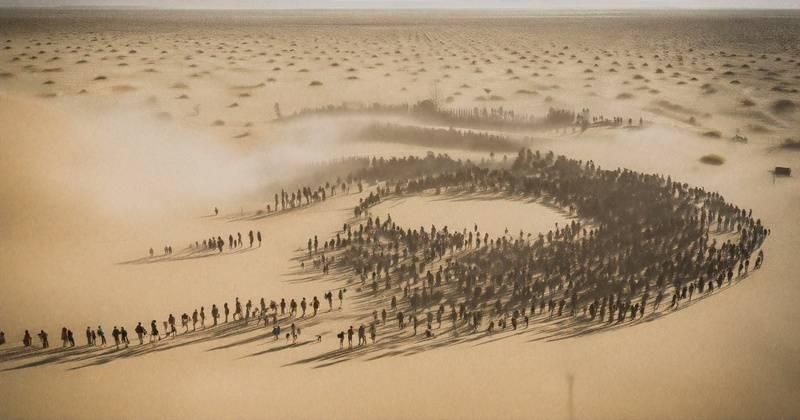They had now encamped at Badr. The men were resting and making preparations, while the Messenger of Allah [sallallahu alayhi wa sallam] was engaged in prayer. During this time, some of the Companions captured two men who had come to draw water from the wells. It was clear that these men were not from the people of Badr. The Companions questioned them, seeking to know who they were and what they knew. They were asked about Abu Sufyan, his men, and the caravan. The two replied, “We have nothing to do with Abu Sufyan and know nothing of him. We have been sent by Abu Jahl ibn Hisham, Utbah ibn Rabi‘ah, and Umayyah ibn Khalaf to fetch water for their army.”
The Companions doubted their words and pressed them for a confession. When beaten, they fearfully claimed to be from Abu Sufyan’s caravan. Satisfied with this answer, the Companions released them. The men resumed drawing water. When the Prophet [sallallahu alayhi wa sallam] finished his prayer, he said, “You strike them when they tell the truth and let them go when they lie! They are indeed from Quraysh’s army.”
The water carriers were thus a sign that the Quraysh army was near. The Messenger of Allah questioned them further: “Tell us about Quraysh—how many are they?” One of the captives pointed toward a distant sandhill and said, “They are behind that dune you see.”
“How many men?” the Prophet asked.
“They are many,” came the reply.
“How many animals do they slaughter each day?”
“One day nine, the next day ten.”
From this, the Prophet [sallallahu alayhi wa sallam] concluded, “They are between nine hundred and a thousand.” Then he asked again, “Who among Quraysh’s chiefs are with them?”
They began to list the names: “Utbah ibn Rabi‘ah and Shaybah ibn Rabi‘ah, Abu’l-Bukhturi ibn Hisham, Hakim ibn Hizam, Nawfal ibn Huwaylid, Umayyah ibn Khalaf and his sons, Abu Jahl ibn Hisham, Suhayl ibn Amr…”
These were the pillars of Quraysh—their wealthiest, most honored, and most influential men. Hearing this, the Prophet turned to his Companions and said, “Behold, O my Companions—this is Makkah, throwing before you its dearest sons.”
When news came that the caravan had escaped, many among the Quraysh wanted to turn back. Yet Abu Jahl refused. Badr was one of the great fairs of Arabia—a place where tribes from across the peninsula would gather. Whatever happened there would quickly spread and be spoken of everywhere.
Abu Jahl sought not only to face the Muslims but to make a public display of his power. “By Allah,” he declared, “we shall go to Badr, stay there for three days, slaughter our camels, feast, drink wine, and make merry. All Arabia will hear of our strength and glory. They will fear us. March on!”
Efforts by Akhnas of Banu Zuhrah to dissuade him were in vain. The Quraysh pressed forward and encamped behind the dunes near Badr.
The Muslim army, meanwhile, had settled on the north side of the Badr well—close enough to the water but still between it and the approaching enemy.
At this point, Hubab ibn al-Mundhir [radiyallahu anh] approached the Prophet [sallallahu alayhi wa sallam] and said:
“O Messenger of Allah! Is this place where we have halted one that Allah has commanded you to occupy, so that we may neither advance nor retreat from it? Or is it a matter of opinion, strategy, and military advantage?”
The Prophet replied, “It is a matter of opinion, strategy, and military advantage.”
Upon hearing this, Hubab offered his counsel: “Then, O Messenger of Allah, let us move closer to the well, placing it between us and the enemy. Let us fill the cisterns near them with stones so that they cannot use them. Thus we will have water while they will not.”
The Prophet [sallallahu alayhi wa sallam] approved of this wise suggestion and ordered the camp to be moved accordingly.
That night, the Messenger of Allah spent the hours in prayer and supplication. A gentle rain began to fall—cooling the air and soothing the hearts of the believers. They saw it as a sign of mercy and divine support. The sand, once loose beneath their feet, became firm; the ground no longer slipped, and the air cleared of dust. Steadfast hearts would now stand upon steady earth.
At dawn, the Quraysh army began to descend from the slopes into the valley, their ranks filling the plain. Watching their advance, the Prophet [sallallahu alayhi wa sallam] turned to his Lord and prayed:
“O Allah! Here comes Quraysh, filled with pride and arrogance, defying You and denying Your Messenger. O Allah, I ask You for the victory You have promised me. O Allah, destroy them this morning!”
Thus, the two forces met—just as Allah had decreed:
“Had you made a mutual appointment to meet, you would surely have differed about the time and place; but Allah brought you together according to His command.” (Al-Anfal, 42)
Quraysh had marched nearly three hundred kilometers from Makkah; the Muslims, about one hundred and fifty from Madinah. Now they stood face to face—on the brink of a confrontation that would forever change the course of history.

